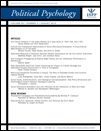Political Psychology (journal)
 | |
| Discipline | Political psychology, Psychology, political studies |
|---|---|
| Language | English |
| Edited by | Catarina Kinnvall |
| Publication details | |
| Publisher |
Wiley-Blackwell on behalf of the International Society of Political Psychology |
Publication history | 1980-present |
| Frequency | Bimonthly |
| 2.384 | |
| Indexing | |
| ISSN |
0162-895X (print) 1467-9221 (web) |
| LCCN | 79644318 |
| CODEN | POPSEO |
| OCLC no. | 44544062 |
| JSTOR | 0162895X |
| Links | |
Political Psychology is a peer-reviewed academic journal published bimonthly by Wiley-Blackwell on behalf of the International Society of Political Psychology. The editor-in-chief is Catarina Kinnvall (Lund University, Sweden).
The journal of the International Society of Political Psychology is dedicated to the analysis of the interrelationships between psychological and political processes. International contributors draw on a diverse range of sources, including cognitive psychology, political science, economics, history, international relations, philosophy, political theory, sociology, and social and clinical psychology.
According to the Journal Citation Reports, the journal has a 2014 impact factor of 2.384, ranking it 8th out of 161 journals in the category "Political Science" and 12th out of 62 journals in the category "Psychology Social".[1] Political Psychology is in over 4,000 institutions worldwide, and in 2013 there were over 605,000 downloads of manuscripts published in the journal.
The journal Political Psychology is housed at the The European Centre for Political Psychology (ECPP) at Lund University, Sweden.
Editor-in-Chief: Catarina Kinnvall
Editorial Manager: Sarah Scuzzarello
Co-editors: John Cash, Caroline Howarth, Orla Muldoon, Martin Rosema, Thomas Rudolph Associate editors: Hanna Bäck, Jacob Sohlberg, Martin Bäckström, Emma Bäck
Advances in Political Psychology is the second publication of the International Society of Political Psychology. Given the continued growth and explosion of information and interest in political psychology, ISPP sensed there was an increasing need for a place where cumulative research findings and theoretical developments are synthesized and integrated in a form accessible to the scholar, student, and practitioner. The Advances in Political Psychology annual series is intended to fill this need by recording the state of the field and highlighting innovative developments so that those who are interested can keep abreast of what is happening in political psychology. Each annual volume includes a selection articles that capture the diversity of subject matter studied by political psychologists. The editor-in-chief is Howard Lavine (University of Minnesota, USA).
See also
References
- ↑ "Journals Ranked by Impact: Political Science and Psychology Social". 2014 Journal Citation Reports. Web of Science (Social Sciences ed.). Thomson Reuters. 2015.